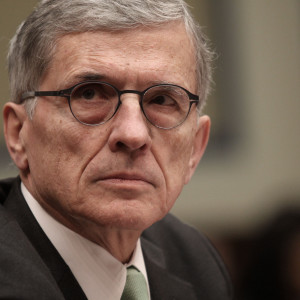The Federal Communications Commission voted Thursday to advance divisive new rules for Internet providers extending high-capacity service to businesses — a move celebrated by net neutrality backers and opposed by the newest entrants to the business broadband market.
Commissioners passed the Further Notice of Proposed Rulemaking along an increasingly frequent partisan 3-2 vote, opening a window to hear comments on new regulations for the “special access” market.
Businesses, hospitals, libraries, schools, public safety offices, ATM networks and wireless providers get high-capacity broadband service via the special access market.
The market itself is made up of incumbent local exchange carriers (ILECs), which are legacy providers like AT&T and Verizon that inherited large swaths of their copper-based network infrastructure from Bell, and competitive local exchange carriers (CLECs), which are small providers like Sprint and Windstream that lease portions of those networks to offer competing service in the special access market.
Special access has been largely deregulated over the years as a result of increased market share meeting FCC goals for competition. Since passage of the FCC’s net neutrality rules last year — subjecting Internet service providers to stricter regulations — complaints have risen among smaller providers that ILECs overwhelmingly dominate the market.
According to CLECs like Sprint, ILECs frequently use anticompetitive leasing rates and so-called “lock-up” contracts to force CLECs into strict terms of service like overcharges for failing to use their maximum network allowance, and make it harder for CLECs to transition onto newer Internet protocol-based fiber networks.
Consumer groups argue those overcharges cost consumers billions annually, and are a detriment to the economy overall.
“The fact is – our current approach is badly, badly out of date,” FCC Chairman Tom Wheeler said in a statement Thursday, adding that while the rules haven’t been developed yet, they will take into account “competition” to the benefit of consumers, a “technology-neutral” framework and encourage transition to Internet Protocol-based networks.
Wheeler highlighted the necessity of the rules to insure wireless providers like Sprint and T-Mobile get competitive rates to deploy 5G, since the service will rely heavily on special access lines to carry the backhaul of Internet data to cell towers.
“No backhaul – no phone call, text or web surfing from your mobile device,” Wheeler said. “This is about consumers. This is about winning the 5G future.”
The tech-neutral approach would apply the same potential regulations to cable broadband providers — the newest entrants into the market, who argue the rules will stifle the competition they’re bringing to special access on their own.
“The chairman claimed that there was limited competition in the business data services area and it needed more regulation, but I would say that we compete every day for that business and it seems counterintuitive that the FCC would want to impose regulations on a new entrant such as us that would bring more competition to the business,” Comcast CEO Neil Smit said during the cable giant’s first-quarter earnings call.
Republican Commissioners Ajit Pai and Michael O’Rielly agreed with complaints of Smit and others.
“[I]n the world of the looking-glass, everything is backwards. Incumbents are losing customers and revenues every year — and so they must have market power. The competitive supply of unregulated ethernet services is taking off — and so those and other next-generation services must now be regulated,” Pai said Thursday.
“Our goal should be ubiquitous competition, not universal rate regulation,” he continued. “I cannot support the notice’s sentence-first, verdict-afterward nonsense, and I accordingly dissent.”
While the current market isn’t ideal, O’Rielly said that doesn’t constitute the FCC swinging “to the opposite side of the pendulum,” and “casting aside logic, precedent and basic economic principles in a quest to check off another special interest box by the end of the year.”
“Getting the special access regulation wrong could cause significant harm to the marketplace,” he added.
Smaller providers and net neutrality advocates celebrated the kickoff of the rulemaking process.
“[T]he FCC formally recognized what competitive carriers have long experienced, that large incumbents exercise overwhelming market power and impose unreasonable rates, terms and conditions over a critical part of our nation’s networks,” Charles McKee, Sprint’s vice president of government affairs, said Thursday. “In laying out a framework for reform, the FCC sets the stage for greater broadband competition that will ultimately benefit all consumers.”
Phillip Berenbroick, government affairs counsel at Public Knowledge, said the lack of competition has cost consumers $150 billion in just the last five years, “raising the prices on everything from healthcare and financial services to education and other government services.”
“Where special access markets are not competitive, the commission could act to ensure that business customers, wholesale providers, and ultimately, consumers, aren’t forced to pay unjustifiable or unreasonable special access rates,” he said.
The claim of $150 billion in costs to consumers has been challenged by economists.

